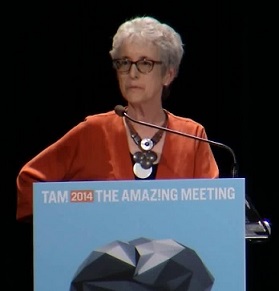 At a conference chock full of terrific presentations from pithy professionals and assorted smart folks, Tavris’s talk stood out. Titled “Who’s Lying, Who’s Self-Justifying?”, Tavris recounted recent headlines involving allegations of sexual coercion or assault before meticulously describing the key elements that lead to “he said, she said” reports and, importantly, why these scenarios might happen even when every person is telling the truth as they see it. She bolstered her presentation with numerous citations of the psychology literature and used familiar examples to relate points more easily.
At a conference chock full of terrific presentations from pithy professionals and assorted smart folks, Tavris’s talk stood out. Titled “Who’s Lying, Who’s Self-Justifying?”, Tavris recounted recent headlines involving allegations of sexual coercion or assault before meticulously describing the key elements that lead to “he said, she said” reports and, importantly, why these scenarios might happen even when every person is telling the truth as they see it. She bolstered her presentation with numerous citations of the psychology literature and used familiar examples to relate points more easily.
My observation is that in discussions of these situations people are often talking past each other, writing each other off, or battling over prima-a-priori as a political issue, by which I mean who should be assumed correct before the evidence is known (that’s not an expression, but it should be). For these reasons, Tavris’s talk was a breath of fresh air. She remedies these issues in two important ways.
First, by defusing the issue of blame and dissociating consideration of causes from consideration of how to fairly, justly, and sensibly parse allegations of assault. This is not to say, and she does not say or imply, that causes or blame are not important, they are. But they are served by a dispassionate understanding of the psychology to include how memory and perspective work. How they fail, when, and why.
Second, Tavris has a real talent for plain-spoken, direct address that cuts to the quick. Her oratory is thoughtful and deliberate. Bracing and poignant. Reserved and strong. But don’t take my word for it. Here is one of the best talks from The Amaz!ng Meeting 2014.
 Carol Tavris is a social psychologist and author whose work focuses on critical thinking and the criticism of pseudoscience in psychology, among other topics. Her articles, book reviews and op-eds have appeared in the New York Times, the Los Angeles Times, the Wall Street Journal, and the Times Literary Supplement, among other publications. Many of these essays and reviews are available in Psychobabble and Biobunk: Using psychological science to think critically about popular psychology. Dr. Tavris is coauthor, with Elliot Aronson, of Mistakes Were Made (But Not By Me): Why we justify foolish beliefs, bad decisions, and hurtful acts–a book that has become something of a bible, dare we say, of the skeptical movement. She is also the author of the bestselling classics Anger: The misunderstood emotion and The Mismeasure of Woman, and coauthor of two leading introductory psychology textbooks. A fellow of the American Psychological Association and the Association for Psychological Science, she has lectured to a wide diversity of audiences around the world.
Carol Tavris is a social psychologist and author whose work focuses on critical thinking and the criticism of pseudoscience in psychology, among other topics. Her articles, book reviews and op-eds have appeared in the New York Times, the Los Angeles Times, the Wall Street Journal, and the Times Literary Supplement, among other publications. Many of these essays and reviews are available in Psychobabble and Biobunk: Using psychological science to think critically about popular psychology. Dr. Tavris is coauthor, with Elliot Aronson, of Mistakes Were Made (But Not By Me): Why we justify foolish beliefs, bad decisions, and hurtful acts–a book that has become something of a bible, dare we say, of the skeptical movement. She is also the author of the bestselling classics Anger: The misunderstood emotion and The Mismeasure of Woman, and coauthor of two leading introductory psychology textbooks. A fellow of the American Psychological Association and the Association for Psychological Science, she has lectured to a wide diversity of audiences around the world.
